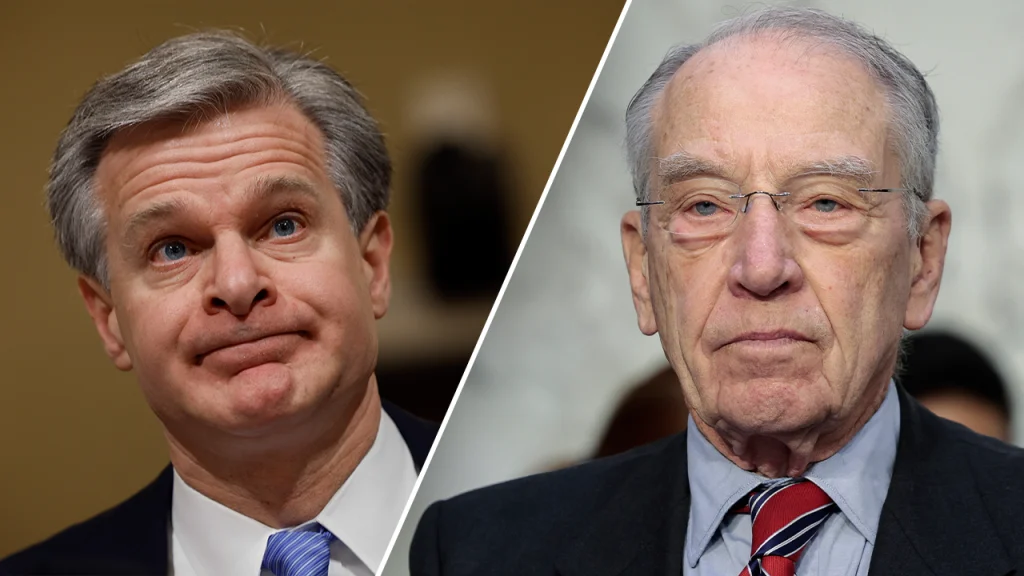Senator Chuck Grassley, a Republican from Iowa and a member of the Senate Judiciary Committee, has vehemently expressed his lack of confidence in FBI Director Christopher Wray, calling for his resignation and that of Deputy Director Paul Abbate. Grassley’s discontent stems from what he perceives as a series of failures and breaches of trust during Wray’s tenure, culminating in an 11-page letter detailing his grievances. The senator’s call for new leadership coincides with former President Trump’s nomination of Kash Patel, a staunch Trump ally, to replace Wray as FBI director, should Trump be re-elected. This nomination adds another layer of complexity to the already strained relationship between the FBI and a segment of the Republican party.
Central to Grassley’s accusations is the FBI’s search of Trump’s Mar-a-Lago residence in August 2022. Grassley criticizes the raid as excessive, highlighting the involvement of armed agents and the search of personal areas, contrasting it with the perceived lack of similar action against Hillary Clinton for her handling of classified information. He views this as a blatant example of a double standard and politically motivated targeting of the former president. Beyond the Mar-a-Lago search, Grassley points to what he describes as the FBI’s complicity in a disinformation campaign to discredit his and Senator Ron Johnson’s investigation into the Biden family’s financial dealings. He alleges the FBI provided an unnecessary briefing to Democratic leadership, which was subsequently leaked and misrepresented as evidence of Russian disinformation influencing their investigation.
Further fueling Grassley’s distrust is the FBI’s purported inaction on allegations of bribery involving then-Vice President Joe Biden, his son Hunter Biden, and Ukrainian officials. He criticizes Wray for failing to investigate these claims despite possessing incriminating information for three years, again suggesting a bias against Trump and a reluctance to pursue investigations unfavorable to Democrats. This perceived inaction, coupled with the Mar-a-Lago raid and the alleged disinformation campaign, forms the core of Grassley’s argument for Wray’s dismissal.
Adding to the list of grievances, Grassley accuses the FBI of obstructing congressional oversight by withholding information on various issues. He cites the agency’s refusal to provide details about the handling of sexual harassment claims by female employees, the vetting process of Afghan nationals during the 2021 withdrawal, and the controversial “Richmond memo,” which he characterizes as unfairly targeting traditional Catholics as potential extremists. These instances of alleged stonewalling reinforce Grassley’s perception of a lack of transparency and accountability within the FBI under Wray’s leadership.
The senator’s letter underscores the deep partisan divide surrounding the FBI. While Grassley’s criticisms resonate with some Republicans who view the agency as politicized and biased against conservatives, others maintain that the FBI is acting independently and within its legal authority. The FBI, in response to Grassley’s letter, affirmed its commitment to transparency and congressional oversight, emphasizing Director Wray and Deputy Director Abbate’s efforts to address the issues raised. This response, however, has done little to assuage Grassley’s concerns, highlighting the deep chasm in perspectives.
Trump, in a recent interview, echoed Grassley’s sentiments, expressing his own dissatisfaction with Wray and the FBI’s performance. He criticized the Mar-a-Lago raid and lamented the perceived decline in the FBI’s reputation. This alignment between Trump and Grassley further solidifies the pressure on Wray’s leadership and sets the stage for a potential showdown should Trump be re-elected. The future of the FBI’s leadership remains uncertain, with the potential for significant changes depending on the outcome of the next presidential election and the Senate’s willingness to confirm a new director. The controversy surrounding Wray’s tenure highlights the ongoing debate about the role and impartiality of federal law enforcement agencies in a politically charged environment.


